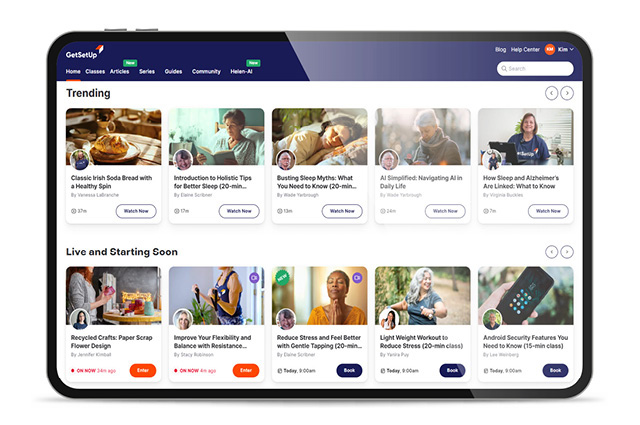| By Gale Staff |
As communities grow and change, libraries have an opportunity to evolve alongside them, meeting the needs of all patrons at every stage of life. While early literacy and youth programming remain foundational, many libraries are beginning to explore new ways to support an increasing and vibrant population: older adults.
Adults aged 55+ represent one of the fastest growing demographics in the U.S., and they encompass a wide range of interests, experiences, and goals. Expanding engagement efforts to include older adults can help libraries strengthen community connections, enhance programming, and continue serving as vital, inclusive spaces for lifelong learning.
Curious to learn how? Explore the research below.
The Aging Population Is a Library Growth Opportunity
According to the U.S. Census Bureau, by 2030, all Baby Boomers will be age 65 or older. That means nearly one in five U.S. residents will be at retirement age. By 2060, the 65+ population is expected to almost double, making up nearly one in four Americans.1
This growing population isn’t a passive audience. Older adults are lifelong learners, voters, volunteers, caregivers, and mentors. Many of these individuals are looking for ways to stay socially connected, mentally active, and engaged in their communities.
Older adults are interested in everything from keeping up with the latest technology to learning about travel destinations to starting a small business and much more. Libraries that meet these demands can deepen community ties and expand their patron base.
Fuel Healthy Aging with Lifelong Learning
Research shows that cognitive engagement in later life can delay memory loss and dementia.2 Libraries already excel at providing access to knowledge, but tailoring resources to older adults can make lifelong learning more accessible and effective.
Many older adults want to explore hobbies, dive into history, focus on their health, or stay protected from fraud and scams. Platforms like Gale Presents: GetSetUp deliver engaging online classes created by older adults, for older adults, covering everything from wellness and technology to creativity and personal finance. With minimal staff and training time needed, GetSetUp can help libraries offer impactful, modern learning experiences that older patrons love.

Combat Social Isolation and Loneliness with Community Building
Social isolation and loneliness among older adults are pressing public health concerns. According to the CDC, social isolation significantly increases the risk of premature death, and it’s linked to higher rates of depression and cognitive decline.3
Libraries can play a critical role in promoting social connection and engagement for older adults. Whether it’s a knitting circle, a current events discussion group, or a digital “how-to class,” offering consistent programming for adults aged 55+ creates community and connection.
Digital resources like Gale Presents: GetSetUp can help drive this social connection for older adults in your library. Designed for individuals aged 55+, GetSetUp offers a vibrant online community for patrons to connect with like-minded peers and learn new skills through live and on-demand classes.
Bridge the Digital Divide by Building Confidence in New Technology
Despite growing interest in technology, many older adults lack confidence in their digital skills. The digital divide often becomes a barrier to everything from telehealth appointments to staying in touch with family.
Libraries are uniquely positioned to help older adults feel empowered using new technology. Your library can make a world of difference by offering digital skills programming, Wi-Fi access, and device lending. With the right support, older adults can become confident, independent technology users, increasing their quality of life and civic participation.
With Gale Presents: GetSetUp, libraries can provide on-demand access to accessible support and digital literacy tools for older adults to improve their technology skills. Aging patrons can learn from and alongside their peers as they get tips to navigate today’s digital world.
Engaged Older Adults Drive Economic and Civic Impacts
Older adults give back—often in big ways. They’re mentors, poll workers, local business owners, and dedicated volunteers. An engaged older population strengthens the economy and builds a more resilient community.
By investing in older adult engagement, libraries help unlock this potential. And when older adults feel seen and supported, they become some of the library’s most passionate advocates.
Proven Tools Make It Easy to Serve Your Aging Community
As older adults redefine what it means to age, libraries have a powerful opportunity to serve this vibrant and growing population. By investing in older adult engagement, you’re not just filling a programming gap, you’re advancing your mission of lifelong learning, inclusion, and community enrichment.
Ready to empower older adults to pursue their interests and connect with others? Supporting your aging community doesn’t have to require extensive staff training or building a whole new program from scratch. Start by evaluating your library’s current offerings and ensure you’re providing opportunities for learning, connection, and growth for patrons 55 and older.
If you need additional support, turnkey resources like Gale Presents: GetSetUp are designed specifically to help public libraries engage older adults with meaningful, relevant content and a thriving online community. With this flexible platform, you can offer a rotating catalog of thousands of live and on-demand classes on topics older adults care about, all accessible with a library card.
Try this high-impact, low-lift way to transform your strategy for engaging your aging community. Connect with your rep to learn more about getting started with Gale Presents: GetSetUp.
- Vespa, Jonathan, et. al. “Demographic Turning Points for the United States: Population Projections for 2020 to 2060,” United States Census Bureau, February 2020.
- Bransby, Lisa, et al. “The relationship between cognitive engagement and better memory in midlife,” National Library of Medicine, February 2022.
- “Health Effects of Social Isolation and Loneliness,” CDC.gov, May 2024.




